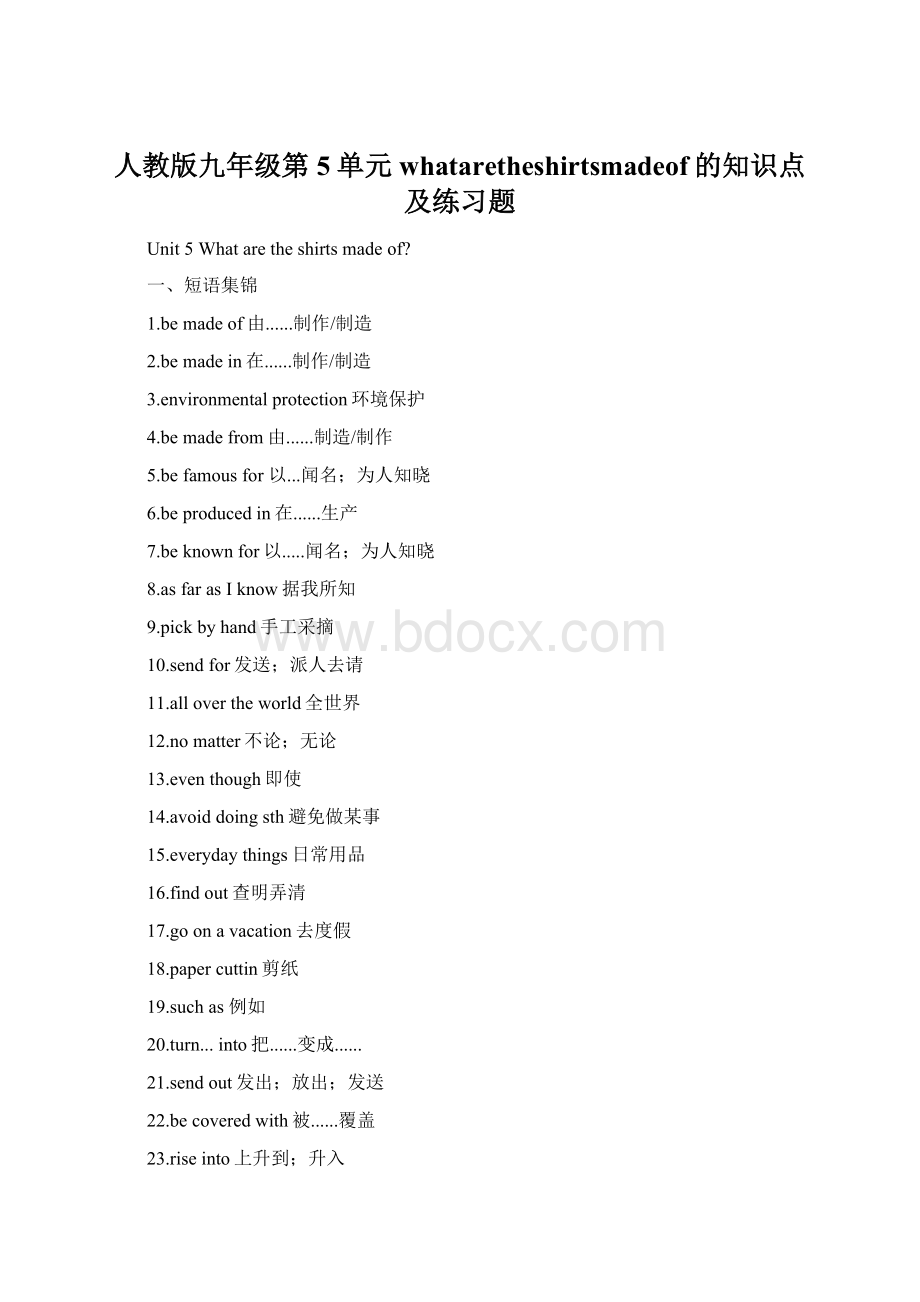人教版九年级第5单元whataretheshirtsmadeof的知识点及练习题.docx
《人教版九年级第5单元whataretheshirtsmadeof的知识点及练习题.docx》由会员分享,可在线阅读,更多相关《人教版九年级第5单元whataretheshirtsmadeof的知识点及练习题.docx(18页珍藏版)》请在冰豆网上搜索。

人教版九年级第5单元whataretheshirtsmadeof的知识点及练习题
Unit5Whataretheshirtsmadeof?
一、短语集锦
1.be made of由......制作/制造
2.be made in在......制作/制造
3.environmental protection环境保护
4.be made from由......制造/制作
5.be famous for 以...闻名;为人知晓
6.be produced in在......生产
7.be known for以.....闻名;为人知晓
8.as far as I know据我所知
9.pick by hand手工采摘
10.send for发送;派人去请
11.all overtheworld全世界
12.no matter不论;无论
13.even though即使
14.avoid doing sth避免做某事
15.everyday things日常用品
16.find out查明弄清
17.go on a vacation去度假
18.paper cuttin剪纸
19.such as 例如
20.turn... into把......变成......
21.send out发出;放出;发送
22.be covered with被......覆盖
23.rise into上升到;升入
24.put on 张贴
25.as symbols of作为......的象征
26.fairy tale 童话故事
27.be used for被用于....
二、重点解析:
1.everyday与everyday
everyday
是形容词,意为“每天的;日常的”,用来修饰名词。
everyday
意为“每天”,在句中通常作时间状语。
用everyday或everyday填空
(1)Youcanfindthatthesentenceiswidelyusedinour____________life.
(2)David'sfathertakesexercise______________.
2.bemadeof表示“由……制造”,通常表示从成品中可以看出原材料
bemadefrom意为“由……制成”(看不出原材料);
bemadein+地点意为“在……(地方)制成”;
bemadeby意为“被……制成”。
3.beknown/famousfor与beknown/famousas
beknown/famousfor
表示“作为……而出名”,后跟出名的原因。
beknown/famousas
表示“以……而出名”,后跟出名时的职业、身份或地位等。
5.nomatterwhat“无论什么”=whatevernomatterwho“无论谁”=whoever
nomatterwhere“无论什么地方”=wherevernomatterwhen“无论什么时候”=whenever
nomatterhow“无论怎样”=however
Whateveryoulike,Iwillbuyitforyou.=__________________youlike,Iwillbuyitforyou.
6.turninto=changeinto变成turnon打开/turnoff关上turnup开大,调高/turndown开小/调低
7.英语中表示“花费”的表达
(1)sbspend时间/金钱onsthsbspend时间/金钱(in)doingsth
(2)sb.paymoneyforsth(3)sth.cost(sb.)+money(注意:
cost的主语一定是物,过去式是cost。
)(4)Ittakes/tooksb.sometimetodosth
练习:
1.Theyspendtoomuchtime______thereport.
A.writingB.towriteC.onwritingD.write
2.--Whatbeautifulshoesyou’rewearing!
Theymustbeexpensive--No,theyonly______l0yuan.
A.spentB.tookC.paidD.cost
3.--Willyouplease______formydinnerPeter?
--Sure!
A.spendB.payC.costD.take
4.Itwill_____metoomuchtimetoreadthisbook.A.takeB.costC.spendD.pay
5.完成那项工作花了他半个小时。
It__________________halfanhourtofinishthework.
6.Howmuchdoestheticket________fromShanghaitoBeijing?
A.cost B.tookC.spendD.pay
7.Ienjoyplayingcomputergames,butIcan't________toomuchtime________that.
A.take;doingB.spend;doingC.spend;fordoingD.take;todo
bemadeof
由......制成
从成制品中可以看出原材料
bemadefrom
由......制成
从成制品中看不出原材料
bemadein
在.....制造
介词in后常接场地
bemadeby
由.....制造
强调执行者
China____theGreatWallintheworld.
A.isknewforB.isfamousasC.isknownfor
Silver__________aringformoney.
A.isusuallymadeintoB.isusuallymadeofC.isusuallymadefrom
Ilikethedumplingsmade________mymotherbest.A.inB.fromC.By
Doyouknowwineis______grapes?
A.madeofB.madefromC.madein
begoodfor
对……有益
后接表示人和事物的名词
begoodto=bekind/friendlyto
对……友好
后接表示人的名词
begoodat=dowellin
擅长……
后接名词、代词或动名词
begoodwith=geton/alongwith
与……相处融洽
后接表示人的名词
☆both…and………和……(两者)都,①用于连接两个并列的句子成分。
当其在句中做主语时,谓语动词用复数形式。
②boh表示两者都…,通常放在行为动词之前,助、情态动词或be动词之后。
☆〖易混辨析〗notonly…butalso…,neither…nor…与either…or…的区别
(1)notonly…butalso…不但…而且…,连接并且成分,当其连接主语时,“就近原则”
(2)neither…nor…既不……也不……,当其连接主语时,谓语动词“就近原则”。
neither…nor…本身含有否定的含义,所以谓语动词要用肯定形式。
(3)either…or…或者…或者…,当其连接主语时,“就近原则”
()1.__Lisa__Lucymaygowithyou,becauseoneofthemmuststayathometotakecareofthedog.A.Notonly,butalsoB.Neither,norC.Both,and.D.Either,or
()2.________hisfather________hismotherareworkinginthatshoefactory.
A.Either,orB.Neither,norC.Both,andD.Notonly,butalso
if
如果
引导条件状语从句
一般情况下,遵循主将从现
是否
引导宾语从句
从句可以根据具体情况选用任何时态
()I____hertheanswerifshe____me.
A.cantell,willaskB.willtell,willaskC.wouldtell,askD.willtell,asks
()Idon’tknowifhe____tomorrow.A.ComesB.WillcomeC.come
☆.nomatter不论,无论。
nomatterwhat=whatever,用来引导状语从句。
nomatter常与疑问词搭配使用,如nomatterhow(无论怎样),nomatterwho(无论是谁),nomatterwhere(无论何地),nomatterwhen(无论何时)等。
以上词组分别相当于however,whoever,wherever,whenever。
().Youshoulddoyourbest______youdo.
A.nomatterwhatB.whateverC.nomatterhow
☆.find→found→foundv寻找
(1)findsb.doingsth发现某人做某事
(2)findit+adj.+todosth发现做某事很……
【辨析1】find/findout/discover/invent
findv发现(指结果)findout查明,弄清,找到,指经过调查,询问等弄清事实的真相
discoverv发现(指发现客观存在的事物)inventv发明(指创造“发明”出来新的东西)
【辨析2】find/lookfor/findout找
(1)findv找到,强调找到的结果
(2)lookfor寻找,强调找东西的过程
用discover和invent完成句子
Columbus__________Americain1492.Who____________thetelephone?
()I____mypeneverywhere,butIcouldn’tfindit.Ihaven’t_____whotookitaway.
A.lookedfor,findB,findout,lookforClookedforfoundout
☆.hold (held,held)拥有,抓住
holdasportsmeeting举行一场运动会holdon等等;别挂电话
holdontodoingsth坚持做某事【注】to是介词,后加名词/代词宾格/ving
☆.competitorn.参赛者;竞争者→competitionn竞争
☆.ownv拥有=have→ownern物主theownerof………的所有者
ownadj.自己的,特有的one’sown某人自己的
他有自己的梦想。
__________________________________
☆ sendsb.sth=sendsthtosb.(寄)送给某人某物
【注】类似的动词有:
show(展示;给……看)give(给)lend(借出)offer(提供)
return(归还)tell(告诉)
请把我的书还给我。
_______________________
☆.introuble处于困境中
⑴in+名词→inneed急需infact事实上indanger.处于危险中
(2)trouble/'trʌbl/n.问题;苦恼
getintotrouble造成麻烦(或烦恼)beintrouble处于困境中⑴
havetrouble(in)doingsth做某事有困难
☆coverv包括;涉及=includen封面;盖子
becoveredwith被......盖住coversth.withsth用某物覆盖某物
☆.light→lit→lightedv点燃(过去式,过去分词:
lighted或lit.)
(1)adj.明亮的,浅色的(反义词:
dark)lightgreen
(2)adj.轻的=notheavy反义词:
heavy
(3)n灯turnoffthelight(4)v点火,照亮(5)不可数名词光线
☆.rise(rose;risen)增加;提高;增强;上升,升起
rise
升起;上升
主语自身移向较高位置
raise
举起;提高
主语发出的动作作用于其他事物
Price_________gradually.Let’s___________ourglassestoTom
☆.scissorsn剪刀(常用作复数,作主语时谓语用复数)apairofscissors一把剪刀
【拓展】成双成对的名词只有复数形式,类似的词还要:
jeans牛仔裤trousers裤子shorts短裤glasses眼镜shoes鞋
“apairof+复数名词”做主语时,谓语动词与pair的形式一致。
()This___________ismadeofmetalandplastic.
A.pairofscissorsB.scissorsC.pieceofscissors
☆.livev居住→aliveadj.活着的→livingadj.有生命的→livelyadj.有生气的makealiving(bydoingsth)通过。
。
。
谋生
他通过在街头唱歌维生。
_____________________
☆.allowv允许
(1)allowdoingsth允许做某事Theydon’tallowsmoking.
(2)allowsb.todosth允许某人做某事MymotherallowsmetowatchTV.
(3)beallowedtodosth被允许做某事
()Twelve-year-oldsshouldnot——todriveinChina.
A.allowB.beallowC.allowedD.beallowed
三、被动语态
(一)语态:
英语的语态是通过动词形式的变化表现出来的。
英语中有两种语态:
主动语态和被动语态。
主动语态表示主语是动作的执行者。
例如:
ManypeoplespeakChinese. 谓语:
speak的动作是由主语manypeople来执行的。
被动语态表示主语是动作的承受者,即行为动作的对象。
例如:
Chineseisspokenbymanypeople.主语English是动词speak的承受者。
(二)被动语态的构成
被动语态由“助动词be+及物动词的过去分词”构成。
人称、数和时态的变化是通过be的变化表现出来的。
现以speak为例说明被动语态在各种时态中的构成。
一般现在时:
am/is/are+spoken 一般过去时:
was/were+spoken
一般将来时:
will/shallbe+spoken 现在进行时:
am/is/arebeing+spoken
过去进行时:
was/werebeing+spoken 现在完成时:
have/hasbeen+spoken
过去完成时:
hadbeen+spoken
(三)被动语态的用法
(1)不知道或没有必要说明动作的执行者是谁。
例如:
Somenewcomputerswerestolenlastnight. 一些新电脑在昨晚被盗了。
(不知道是谁偷的)
Thisbridgewasfoundedin1981.这座桥竣工于1981年。
(2)强调动作的承受者,而不强调动作的执行者。
例如:
TheglasswasbrokenbyMike.玻璃杯是迈克打破的。
Thisbookwaswrittenbyhim.这本书是他写的。
Yourhomeworkmustbefinishedontime.你们的家庭作业必须及时完成。
(四)主动语态变被动语态的方法
(1)把主动语态的宾语变为被动语态的主语。
(2)把谓语变成被动结构(be+过去分词)(根据被动语态句子里的主语的人称和数,以及原来主动语态句子中动词的时态来决定be的形式)。
(3)把主动语态中的主语放在介词by之后作宾语,将主格改为宾格。
例如:
Allthepeoplelaughedathim.→ Hewaslaughedatbyallpeople.
Theymakethebikesinthefactory.→Thebikesaremadebytheminthefactory.
Hecutdownatree.→ Atreewascutdownbyhim.
(五)含有情态动词的被动语态
含有情态动词的主动句变成被动句时,由“情态动词+be+过去分词”构成
Wecanrepairthiswatchintwodays. →Thiswatchcanberepairedintwodays.
Theyshoulddoitatonce. →Itshouldbedoneatonce.
(六)特殊情况
1.Hemadetheboyworkfortwohoursyesterday.→Theboywasmadetoworkbyhimfortwohoursyesterday.
2.MotherneverletsmewatchTV.→IamneverlettowatchTVbymother.
3.JackgavePeteraChristmaspresentjustnow.
→
(1)AChristmaspresentwasgiventoPeterbyJackjustnow.
→
(2)PeterwasgivenaChristmaspresentbyJackjustnow
典型例题
()1.TheOlympicGames___________everyfouryears.
AareheldBwereheldC.areholdingD.willho1d
()2.. —Doyouoftencleanyourclassroom?
—Yes,ourclassroom___everyday.
A.clean B.cleans C.iscleaned D.Cleaned
()3.Somefamouspaintings__________inthehallnextweek.
A.willshowB.wereshownC.isshownD.willbeshown
()4.Theboy_______Tomismade________withoutfoodeveryday
A.named,workB.called,singC.named,todance
()5.Usuallycomputers_________tosearchtheInternet.
A.useB.areusingC.areusedD.used
()6一DidyouhearthatwaterinTaiLakesmeltterrible?
一Yes.Infact,it____.That'sallbecauseofthepeopleandthefactoriesaround.
A.pollutedBwaspollutedChaspollutedD.waspo11ute
()7.MymotherwasangrywithmebecauseI____________lastnightbyher.
A.amseentoplaycomputergamesB.wasseentoplaycomputergames
C.wasseenplaycomputergames
单项选择从每小题所给的三个选项中,选出一个正确答案。
()1.____________lastweek?
A.WhathappenedtoherB.Whatwashappenedtoher
C.Whatwasshehappened
()2.________thegrass__________alittleeveryday?
A.Does,cutB.Is,cutC.Is,cutting
()3.Thisisa__________storythatIwillneverforget.
A.historicalB.historyC.historic
()4._________areusuallyputonwindowsordoorsduringtheSpringFestival.
A.ClaysB.PapercuttingsC.Skylanterns
()5.Peopleo